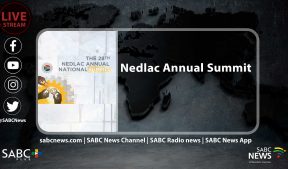Minister Pandor hosts BRICS foreign ministers to thrash out path into the future
SHARE THIS PAGE!
BRICS Foreign Affairs Ministers are currently converging in Cape Town in their continued drive to thrash out a new path to multilateralism that will overhaul the domineering and divisive unipolar Western-led world order.
In preparation for the much-anticipated BRICS Summit in August, SA’s Minister of the Department of International Relations and Cooperation (DIRCO), Dr Naledi Pandor, hosts her counterparts from the BRICS member-states in Cape Town on June 2.
The mid-term gathering provides an opportunity for the Foreign Ministers of BRICS (Brazil, Russia, India, China and South Africa) “to reflect on regional and global developments”.
Russia’s veteran Foreign Affairs Minister Sergey Lavrov is expected to attend in person, making the second visit to the country this year.
China will be represented by the Vice Foreign Minister, Ma Zhaoxu, in the place of Foreign Minister Qin Gang.
Minister Pandor, in her capacity as the current Chair of the BRICS Ministerial Meeting has – in accordance with the practice and policy of inclusive engagement, invited 15 foreign ministers from the continent and the global south as “Friends of BRICS”.
Minister Pandor hosts BRICS Foreign Ministers on Thursday
This bodes well for the increasingly influential bloc.
It is widely speculated that at the August summit in SA, BRICS could adopt a resolution to expand membership.
There are currently seventeen countries that indicated their desire to join BRICS.
However, so far reports are that only five could be accepted this year. They are Argentina, Egypt, Turkey, Saudi Arabia and Iran. Such an expansion will certainly catapult BRICS into a truly special position in global affairs.
Already, BRICS members at the moment represent numerically more people on the planet than all the countries combined. There can be no greater legitimacy to the claim of true representation than that. SA has planned some 200 events as part of its presidency of BRICS throughout its tenure at the helm.
SA’s ambassador for BRICS, Anil Sooklal, says the country is steadfastly committed cooperation and solidarity among members of the strategic global bloc.
SA currently occupies the rotational presidency of BRICS. Pretoria is also set to host the 2023 BRICS Heads of State summit in August.
Ambassador Sooklal made the remarks during his recent visit to China where he met with the Chinese Vice Foreign Minister, Ma Zhaoxu, who is also Coordinator of China’s BRICS Affairs.
Amidst increasingly tense geopolitical relations across the ideologically divided international world order, the five nations in the BRICS bloc of emerging economies regard themselves as “the custodians of genuine multilateralism”.
SA has assumed the BRICS presidency from China. Amb Sooklal says during that time, a series of fruitful achievements were made during China’s tenure at the helm of BRICS.
“BRICS cooperation was taken to a new level,” said Amb Sooklal.
Ma Zhaoxu said China and SA “enjoy a special friendship of comradeship and brotherhood”.
Bilateral diplomatic relations between Beijing and Pretoria were restored 25 years ago in the aftermath of the dawn of majority rule in SA, when President Nelson Mandela became the first democratically-elected leader of a post-apartheid SA.
The two countries enjoy profound political mutual trust and are continuously deepening “mutually beneficial cooperation in various fields, including technology, geopolitics, people-to-people diplomacy, sport, arts and culture, among others.”
Since then, China-SA relations have made remarkable progress, and are regarded as a model of China-Africa relations and South-South cooperation.
President Cyril Ramaphosa has stated that SA’s BRICS membership is destined to help the country to improve its competitiveness, trade linkages and economic growth.
Last year alone, SA’s imports from the other four countries accounted for 29% of SA’s imports, while exports to them made up 17% of the country’s total trade.
Shortly before the advent of COVID-19, tourists from the BRICS countries accounted for 65% of all arrivals in SA.
“It is significant that visitors from India and China can make use of our new eVisa programme to make it easier and less costly to visit our country,” President Ramaphosa says.
SA has also benefited handsomely from cooperative mechanisms under the BRICS framework, having received 5.4 billion US dollars in financial support from the New Development Bank.
The bank, also known as the BRICS Bank, is set to counter the hegemony of the World Bank and the International Monetary Fund (IMF). It’s HQ is based in China.
The constantly deepening ties between China and the rest of the African continent were summed up by China’s Foreign Minister Qin Gang during a very recent ceremony in Beijing to mark Africa Day on May 25.
“When brothers are of one heart and one mind, they have the strength to break metal,” said Minister Qin, who is also the State Councillor. He added: “With continued rise in its international status, Africa has become an important force with global influence.”
Minister Qi further said that the 60th anniversary of the founding of the Organisation for African Unity – the predecessor to the AU, reflected a special time during which Africa and China “offered each other support, sharing weal and woe. From struggles for national liberation to explorations for paths to modernization, from combating Ebola to fighting COVID-19, no matter how the international situation evolves, China has always been there for Africa,” Minister Qi said.
He continued: “In particular, over the last decade, guided by the principles of sincerity, real results, amity and good faith, and of pursuing the greater good and shared interests in developing China’s relations with Africa put forth by President Xi Jinping, China-Africa relations have been growing with the ‘acceleration button on.”
As the current Chair of BRICS, SA should spearhead the expansion of this important bloc and unify the body behind a singular voice in geopolitics, similar to the manner in which the G7 adopts a common stance in its interaction in world forums, including the UN.
The power of BRICS cannot be underestimated, but it depends on how the bloc chooses to use that power. Divided, of course BRICS is weak.
Among the five members, China and Russia are two of the permanent members of the UN Security Council (UNSC). They therefore possess veto power to nullify any undesirable resolution that could adversely affect either individual members or the entire bloc.
As China’s Foreign Affairs Minister Qin observed: “When brothers are of one heart and one mind, they have the strength to break metal.” Indeed, unity is strength.



LIVE: Senzo Meyiwa murder trail
an hour ago
LIVE: 28th Annual National Nedlac Summit
2 hours ago